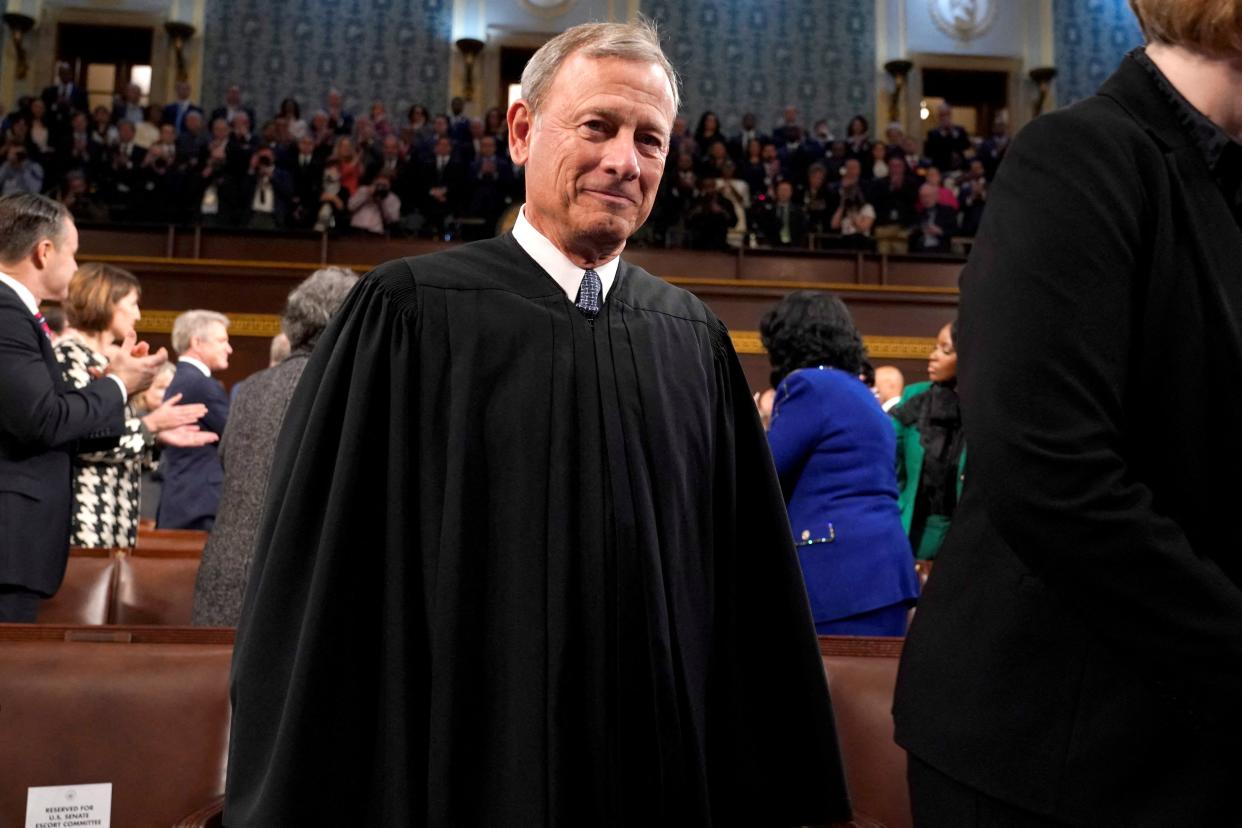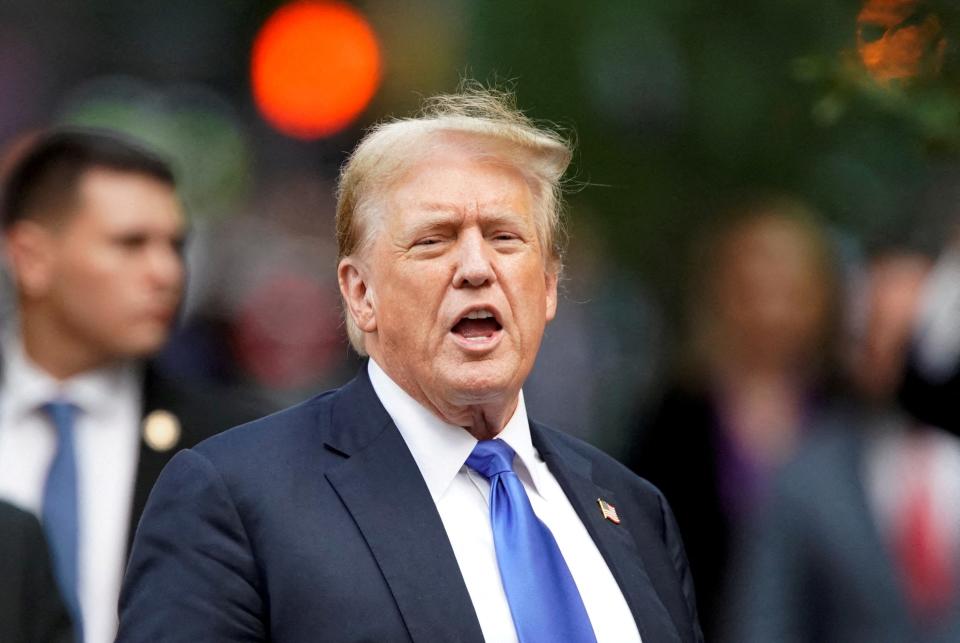What Supreme Court’s immunity ruling means for Trump’s cases and future presidents

- Oops!Something went wrong.Please try again later.
- Oops!Something went wrong.Please try again later.
In a landmark ruling with a potentially major impact on the 2024 presidential campaign, a U.S. Supreme Court majority ruled that presidents — including former President Donald Trump — have immunity from prosecution when carrying out "official acts."
"Under our constitutional structure of separated powers, the nature of Presidential power entitles a former President to absolute immunity from criminal prosecution for actions within his conclusive and preclusive constitutional authority," the court wrote. "And he is entitled to at least presumptive immunity from prosecution for all his official acts. There is no immunity for unofficial acts."
The July 1 decision in Trump v. United States fell along partisan lines, with the six conservative justices voting in the majority and the three liberal justices dissenting.
The ruling follows the June 27 presidential debate and comes amid a campaign in which both political parties have cried foul over perceived abuses of presidential power. This issue is sure to become an issue on the campaign trail.
Here are some key facts to keep in mind from the ruling:
Ruling almost certainly helps Trump avoid further trials before election
In the short term, the ruling will almost certainly delay past this November’s general election Trump’s federal prosecution on charges that he interfered with the 2020 election. That’s because the justices sent the case back to the U.S. District Court for the District of Columbia to determine which elements of the indictment would count as official and unofficial acts, a process that legal experts said cannot be sorted out before Election Day, especially because any trial court decisions could be appealed.
"Today’s ruling ensures that no criminal prosecution of Trump may proceed before the election," Michael Gerhardt, a University of North Carolina law professor, said in an email. "Trump will raise this opinion as a defense."
The campaigns have highlighted perceived presidential power abuses

Trump replied on Truth Social, "BIG WIN FOR OUR CONSTITUTION AND DEMOCRACY. PROUD TO BE AN AMERICAN!" In a fundraising email, the Trump campaign wrote "Crooked Joe Biden KNEW this case would fall apart, but he STILL had his out-of-control DOJ try to TAKE ME DOWN!"
Biden is not responsible for decisions by prosecutors to present cases to grand juries.
Trump has called the New York case a "Biden trial," which we rated false. The Manhattan district attorney’s investigation into Trump’s business records began before Biden was president, but Biden was president by the time Trump was charged in 2023. While District Attorney Alvin Bragg hired a former Justice Department lawyer, that doesn’t prove that Biden directed the prosecution.
In brief remarks that evening, Biden said the Supreme Court's ruling means, "For all practical purposes, today’s decision almost certainly means that there are virtually no limits on what the president can do." Biden vowed to continue to "respect the limits of the presidential powers" and expressed concern over preserving democracy.
The Biden campaign said in a statement, "Today’s ruling doesn’t change the facts, so let’s be very clear about what happened on January 6th: Donald Trump snapped after he lost the 2020 election and encouraged a mob to overthrow the results of a free and fair election." On that day, Trump held a "Save America" rally at which he repeatedly said there was a need to "fight" and invited his supporters to go to the Capitol. Trump often highlights that he used the word "peacefully" during his remarks.
The Biden campaign also highlighted past Trump statements, including that he is "promising to be a dictator ‘on Day 1’" — a reference to Trump’s December interview with Fox News’ Sean Hannity, when Trump said during the interview that he would be a dictator only on "Day 1" adding, "We are closing the border and we are drilling, drilling, drilling. After that, I am not a dictator, OK?"
Trump has made other comments that sound authoritarian. The Biden campaign also said Trump had promised "a bloodbath if he loses."
Trump was discussing the auto industry and electric vehicles in March when he made the "bloodbath" comment.
Biden’s campaign also highlighted Trump’s remark about terminating the Constitution. In 2022, Trump said on Truth Social that election fraud could be the basis for the "termination" of rules found in the Constitution, although days later he sought to walk back his words, writing in a new post, "The Fake News is actually trying to convince the American People that I said I wanted to ‘terminate’ the Constitution," and called it "disinformation and lies."
We fact-checked Trump’s statement that election fraud allows the termination of rules, including in the Constitution, and rated it Pants on Fire.
The ruling significantly limits checks on presidential power
The ruling’s longer-term implications could be just as important as its impact on Trump’s legal cases.
Chief Justice John Roberts’ majority opinion is the "ultimate clapback for Watergate," Stephen Griffin, a Tulane University law professor, said in an email. In the 1970s, President Richard Nixon "need never have feared prosecution, and President Gerald Ford’s pardon would have been completely unnecessary."
Justice Sonia Sotomayor made this argument in her sharply worded dissent, which Mark Osler, a University of St. Thomas law professor, called "the most chilling part" of the opinions released today.
Sotomayor wrote that the decision "effectively creates a law-free zone around the president, upsetting the status quo that has existed since the founding. … Orders the Navy’s Seal Team 6 to assassinate a political rival? Immune. Organizes a military coup to hold onto power? Immune. Takes a bribe in exchange for a pardon? Immune. Immune, immune, immune. … In every use of official power, the President is now a king above the law."
The majority offered phrases in its opinion that suggest limits to presidential immunity.
Roberts argued that "the president is not above the law," writing that "the president enjoys no immunity for his unofficial acts, and not everything the president does is official."
However, Roberts added that a president "may not be prosecuted for exercising his core constitutional powers, and he is entitled to at least presumptive immunity from prosecution for his official acts."
The ruling "effectively makes criminal prosecutions of former presidents all but impossible, whatever Roberts may have said," said Frank Bowman, a University of Missouri emeritus law professor. "Virtually any awful thing a president can do in office can arguably be placed in either the core power or official conduct box, thus affording the president's crimes either absolute or presumptive immunity."
Our sources
Georgia Appeals Court, Donald John Trump v. The State, 2024
Atlanta Journal-Constitution, Georgia court sets Oct. 4 as tentative hearing date in Fani Willis appeal, June 3, 2024
CNN, Georgia court of appeals indefinitely pauses the election subversion conspiracy case against Donald Trump, June 5, 2024
PolitiFact, The Supreme Court will decide Donald Trump’s immunity case. Here are the arguments. April 22, 2024
Former President Donald Trump, Truth Social post, June 15, 2024
PolitiFact, Live: Fact-checking Joe Biden and Donald Trump’s first 2024 presidential debate, June 27, 2024
Biden campaign, Statement on Supreme Court ruling, July 1, 2024
Georgetown law professor Steve Vladeck, X post, July 1, 2024
Manhattan District Attorney, Letter to Judge Merchan, July 2, 2024
Email interview with Anthony Michael Kreis, George State University law professor, July 1, 2024
Email interview with Jerry Goldfeder, senior counsel at the law firm Cozen O'Connor, July 1, 2024
Email interview with Stephen Griffin, Tulane University law professor, July 1, 2024
Email interview with Michael Gerhardt, University of North Carolina law professor, July 1, 2024
Email interview with Joan Meyer, partner at the law firm Thompson Hine LLP who has worked as a prosecutor at the federal and local level, July 1, 2024
Email interview with Brian Kalt, Michigan State University law professor, July 1, 2024
Email interview with Mark Osler, University of St. Thomas law professor, July 1, 2024
Email interview with Frank Bowman, University of Missouri emeritus law professor, July 1, 2024
Telephone interview with Melissa Redmon, University of Georgia School of Law clinical assistant professor and director of the Prosecutorial Justice Program, July 1, 2024
See links for additional sources.
This article originally appeared on Austin American-Statesman: What Supreme Court’s immunity ruling means for future presidents

